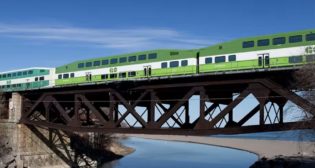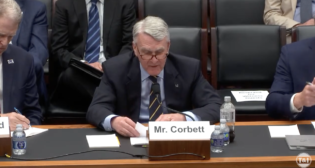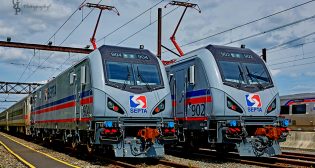
MBTA Looks To ‘Regional Rail’ Model; Massachusetts to Explore ‘Future of Work and Life’
Written by Marybeth Luczak, Executive EditorMBTA Commuter Rail is moving toward a “regional rail” model with its new spring service schedule going into effect April 5. In addition, the Executive Office of the Massachusetts Governor is inviting Request for Responses (RFR) to conduct a “Study on the Post-Pandemic Future of Work and Life in the Commonwealth.”
For MBTA Commuter Rail and contract operator Keolis Commuter Services, advancing a regional rail approach will provide “more flexible options” for riders and “opportunities to add trains more easily in the future,” as ridership patterns continue to evolve due to the pandemic.
While spring schedules will be finalized in March, the partners said there will be fewer morning and evening peak trains, but additional midday trains to provide more regularly scheduled service. The move will result in approximately 11% fewer weekly trains vs. the fall 2019 pre-COVID-19 schedule, and an approximately 18% improvement in rolling stock utilization.
Weeknight commuter rail service after 9 p.m. will largely remain, with “only very late or extremely low ridership trains eliminated,” they added.
State House News Service, reporting on a Feb. 22 MBTA board meeting discussion, offered more details: Most commuter rail lines “will run a train inbound or outbound roughly once per hour over the course of the day under the new system.” Additionally, most “will run a final train departing Boston around 11 p.m. instead of ending by 9 p.m., partly thanks to federal stimulus funding that helped close the agency’s massive budget gap.”
The MBTA Spring 2021 Service Changes website also noted that seven of the commuter rail lines—Greenbush, Kingston/Plymouth, Fitchburg, Franklin, Haverhill, Lowell and Needham—will not offer weekend service as of April 5.
“Travel patterns have changed and will continue to evolve,” MBTA General Manager Steve Poftak said in a statement. “As we look to the spring, we can be even more efficient with taxpayer dollars while ridership is low and use this time to shift toward a schedule that could be more attractive to future riders. The intent is to pilot a service model closer to regional rail.”
“This shift recognizes that fewer and fewer people commute 9-5,” Keolis CEO and General Manager David Scorey said in a statement. “We plan to offer a schedule that can attract an entirely new type of rider and offers flexibility to add service when the time is right.”
The commonwealth of Massachusetts is also considering how the pandemic will affect the way residents live and work. “It is critical that we understand these shifts—and lean into what this reset means—so that we create the community-building, housing, economic development, and transportation programs that align with these changes,” the Office of the Governor wrote in its recently released RFR. It is seeking a “comprehensive impact study” that identifies “significant trends driven by the response to the pandemic, the likely short and long-term impact of those trends across multiple future scenarios, drivers of those scenarios, and policy guideposts along the way.”
Among the insights the commonwealth is looking for the study to provide: “the evolving impact of the Covid-19 pandemic on the population size, workforce, real estate, demographics, locations, and behaviors in Massachusetts”; impacts on state revenue based on potential future scenarios, and potential policy responses to those impacts; the impact of permanent increased e-commerce deliveries on transportation networks (freight, secondary roads); and the impact of various future work scenarios on MBTA ridership (commuter rail, bus, and heavy rail), commuting patterns and volume. The RFR deadline is March 1.


